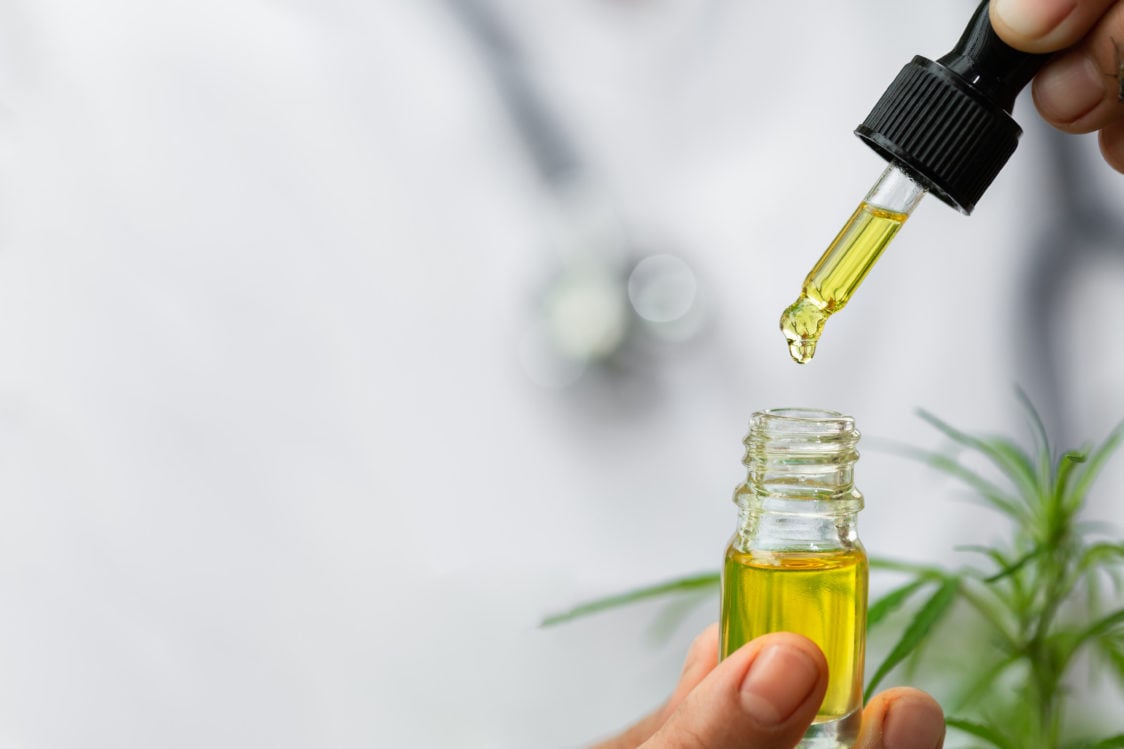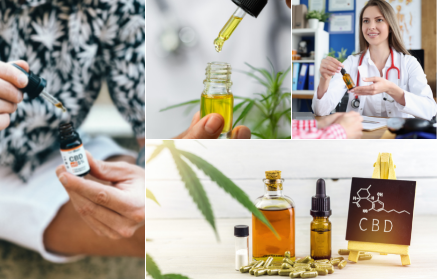Table of Contents
If you’re interested in fitness, healthy living or natural health care substances, you’ve probably already come across CBD or cannabidiol. The popularity of this substance has skyrocketed in recent years. This is evidenced by the fact that the CBD market is expected to grow from $2.8 billion in 2020 to $16 billion by 2026. CBD is already being added to beverages, candies, capsules and cosmetics.
The most popular form is concentrated CBD oil. People often promise it will help them solve all their health problems. Is CBD really capable of delivering all that is expected of it, or is the reality not so promising? Find out more in today’s article.
What is CBD, and how is it obtained?
CBD or cannabidiol, comes from the notorious cannabis sativa plant. It is popular for its high content of active compounds, led by THC, which is the best known of them. These substances are generally called cannabinoids, and CBD is the second most abundant cannabinoid in cannabis. However, unlike THC, it does not have psychoactive effects and, according to current knowledge, is not addictive. Its properties are more likely to be associated with therapeutic purposes, in particular to help with pain, symptoms of depression or anxiety and sleep disorders. [1]
The use of CBD is regulated by national medical authorities. Each country may have a slightly different way of allowing its use. However, the standard is to use an extract of industrial hemp, which has a minimum THC content of 0.2-0.3%, in commercially available products. This is perfectly fine within local laws, and there is no need to worry about the effects of THC. [1]

What are the effects of CBD on the human body?
The huge interest in CBD took off at a time when people started talking about its positive effects in the treatment of childhood epilepsy. This triggered a wave of studies, testing and a search for more uses for the substance over the next few years. Thus, among the areas explored, CBD relieves pain, inflammation, multiple sclerosis and epilepsy. While the results from these studies look promising, they are not yet enough to confirm 100% of CBD’s effectiveness. Scientists still need a number of answers to questions surrounding appropriate dosage or effects with long-term use. [2]
When experts searched for answers to what’s behind CBD’s remarkable properties, they found that it can bind to the endocannabinoid system in the brain. This consists of several receptors that have been shown to improve mood, metabolism (fat breakdown), reduce pain or support immune function. You can also increase the activity of these receptors by exercising or with cold water therapy. The endocannabinoid system was first described quite recently (1992) and its effects are still under investigation. However, from what we already know, we can deduce that it is closely related to human health and overall well-being. [1-4]

What are the effects of CBD?
The health effects of CBD use have only begun to be studied more intensively in recent years. Thus, there are few human studies to confirm its effects.
Those that have already taken place, however, have produced promising results for pain reduction, treatment of anxiety, depression, inflammatory diseases, epilepsy, Parkinson’s and Alzheimer’s disease, and sleep disorders.
In order to reliably confirm the effectiveness of CBD through the lens of Evidence Based Medicine, further studies and detailed research is required. [5]
What effect does CBD have according to users of this substance?
Due to the high popularity of CBD, there is already a fairly good database of user experiences. [6-7]
What can be expected from CBD?
- a greater sense of calm and relaxation
- reduces pain
- better sleep
- reduces symptoms of depression and anxiety
- better concentration and memory
- greater muscle relaxation
- increased energy levels
- greater self-confidence
You might be interested in these products:
Five areas of life that CBD can has a positive effect on
Due to its properties, CBD has the potential to help with a range of health conditions. It can also positively influence and improve various areas of our daily lives. For what reasons is CBD most commonly used, and what is the science behind it?
1. Improves sleep
Sleep problems can significantly reduce quality of life. People who suffer from such problems can tell about it. They often look for ways to prevent them and get a better quality sleep. CBD can be a helping hand. In fact, current knowledge shows that it has an effect on the regulation of the wake-sleep cycle via the endocannabinoid system. The effect itself is frequently determined by the dose administered. Smaller amounts of CBD are more likely to have a stimulating effect, while higher doses are more likely to calm and help people fall asleep. [8]
According to studies conducted on the subject, CBD can help with insomnia or excessive daytime sleepiness. In one study, patients suffering from insomnia took 160 mg of CBD per day. This resulted in them getting a longer, more restful and overall better quality sleep. [8-10]
Interesting results also came from a study that examined the effect of CBD in patients with anxiety and trouble sleeping. A daily dose of 25 mg of CBD in capsules for one month resulted in 79% of subjects experiencing an improvement in anxiety symptoms, and 66% of subjects confirmed an improved sleep quality. In the long term, however, CBD had more sustained and stable results in addressing anxiety symptoms. [11]
If you want to learn more tips for a better sleep, read our article How to Fall Asleep Quickly? Try Our Simple Tips for a Better Sleep.

2. Psychological health
Impaired mental health has an adverse effect on a person’s daily life and functioning in society. According to available studies, CBD could help in this respect as well. In animals, it has been shown to reduce symptoms of stress and anxiety. In human studies, CBD has produced interesting results in patients with social phobia or post-traumatic stress disorder. [12]
The results of scientific work known to date suggest that CBD could have a positive effect with long-term use (see anxiety and sleep studies above), but also after one single administration. This was confirmed, for example, in a study with patients who suffered from social phobia. They were given a dose of 600 mg of CBD an hour and a half before a public appearance. Compared to the placebo, they showed weaker symptoms of anxiety and less psychological discomfort overall. [13]
The mechanism of action behind CBD’s effect on the psyche is not yet fully understood. However, the ability of the substance to affect the activity of the hormone serotonin is probably behind it. This helps to regulate mood, and its deficiency is associated with depression and anxiety. [12]
Adaptogens can also help with stress and maintaining psychological well-being. If you are interested in this topic, you should not miss our article Adaptogens: Natural Substances that Help Manage Stress.

3. Reduces pain
Pain reduction is one of the most common reasons for using CBD or other cannabis products with analgesic effects. There are now even a number of approved CBD-containing medicines that are prescribed to pain sufferers in some countries. For example, they are used by people with joint disease, nerve damage, migraines or cancer. [14-15]
Unfortunately, scientists don’t know yet what exactly is behind CBD’s pain-reducing effects. But it appears that its ability to bind to the endocannabinoid system probably plays a role. The latter can trigger an anti-inflammatory response and fight pain. One study found that CBD can increase the activity of a particular endocannabinoid, anandamide. This has been associated with a reduction in pain, improved mood and a sense of well-being. The results of recent research also suggest that CBD may not reduce pain per se, but it does make it more bearable. [14-15]
If you suffer from joint pain, you should not miss our article How to Choose the Best Joint Supplement?

4. Supports brain function
In recent years, CBD has been added to drinks, bars or tablets that promise better concentration and an overall boost to brain function. What’s behind it? According to research, CBD affects the activity of the neurotransmitters glutamate and gamma aminobutyric acid (GABA). Their optimal levels in the body are crucial for proper memory and learning function. [16]
Changes in brain activity have also been observed in studies with healthy individuals and patients with mental illness. In both cases, researchers have observed an effect on parts of the brain that are related to cognitive processes (attention, memory, information processing). [17]
CBD’s beneficial effects on brain function may also be due to its neuroprotective effects. It may act as a protection for nerve cells against damage and ageing. As a result, it has promising potential for use in diseases such as Parkinson’s or Alzheimer’s. Currently, CBD is already being used in a rare type of childhood epilepsy. [17, 1]
If you’re wondering what else you can do to boost brain function and concentration, read our article How to Improve and Maintain Concentration at Work and During Study?

5. Better recovery after sports
The popularity of CBD oils and other products with this substance is also on the rise among athletes. They are often looking for ways to maximize their body’s regeneration and sports performance. This is where CBD can help. It is probably thanks to its positive effect on the quality of sleep, which is essential for recovery. Another piece to the overall mosaic is its anti-inflammatory properties. The studies have shown that it can reduce the pain of strained muscles after exercise. [19–20]
In one of those studies, researchers compared the effect of MCT oil alone and MCT oil enriched with 16 mg of CBD on muscle pain after exercise (DOMS – Delayed Onset Muscle Soreness). Athletes who received oil with CBD after exercise observed lower pain scores in 24, 48 and 72 hours than the group that received pure MCT oil. In practice, this could speed up the timing of the next training without the unpleasant pain or muscle stiffness including DOMS. The exact mechanism behind these results is not entirely clear, according to the study authors. [21]
Better recovery will, among other things, boost athletic performance and help prevent injuries. Active individuals can also benefit from CBD use in terms of supporting their mental health and brain function, which are just as important for quality performance as strong muscles. In the event of an injury, CBD can then help treat swelling, pain, and other uncomfortable symptoms. [22]
Massage aids can also help with muscle recovery after training. If you are interested in this topic, read our article How to Support Recovery with a Massage Gun and Other Aids?

How to use CBD?
You can find a plethora of CBD products in the health or sports nutrition range. For example, you can buy a CBD drink, a protein bar or gummy candies, which are one of the latest hits of CBD manufacturers. However, the CBD content in these products is often low. In this respect, CBD oils with typically higher concentrations of the active ingredient are preferable.
You can find oils on the market with different ingredients and percentages of CBD (most commonly between 5-15%). The amount of CBD in the oil naturally increases with the percentage. In addition to hemp extract, such products often contain coconut oil or MCT oil. This allows for faster absorption rate thanks to their molecular structure. Some contain broad spectrum (full spectrum) CBD, others contain CBD isolate. The difference between the two is that the broad-spectrum one is a source of other cannabinoids as well as antioxidants, vitamins and minerals from the cannabis plant. Compared to isolate, it has a more complex nutritional profie. [23]
CBD oil is most commonly applied using a dropper directly under the tongue. This way, the active substances enter the bloodstream almost immediately. [24]

What is the recommended dose of CBD?
The official daily recommended dose for CBD has not yet been established. In studies, the doses investigated vary considerably, from amounts of less than 5 mg to doses in excess of 600 mg.
However, it is generally recommended to increase the amount of CBD gradually. When using CBD products, also read the manufacturer’s instructions on the packaging.
In case you are taking any medications, you should consult your doctor about the suitability of taking CBD. For example, it may interfere with the effects of medication used to treat epilepsy. [1, 25, 27]
Is it safe to use CBD?
Studies that have looked at CBD use have found no recurring serious side or adverse effects. Also, a review published by the World Health Organisation (WHO) on CBD states that there is currently no evidence of health risks associated with the use of this substance.
However, if you suffer from a medical condition, you should consult your doctor about the suitability of CBD. [26]
What should you remember?
According to current knowledge, CBD is a substance with great potential. Although its effects are still being further explored, research on CBD has already produced interesting results. It can help with sleep, stress, pain or better recovery, for example. Unlike THC, it has no psychoactive or hallucinogenic effects. It is most commonly used in the form of broad-spectrum CBD oils, which also contain other valuable substances from the cannabis plant. Anyone can discover the effects of CBD for themselves.
Do you have someone amongst your friends who is looking for ways to improve their sleep or muscle recovery? Share this article with them. Maybe CBD will help.
[1] Frank, K., Patel, K., Lopez, G., & Willis, B. Cannabidiol (CBD) Research Analysis. – https://examine.com/supplements/cbd/
[2] Policy Lab. 2021 Cannabidiol (CBD) Clinical Trials and Research. – https://policylab.us/clinical-trials/cbd/
[3] Hillard, C. J. Circulating Endocannabinoids: From Whence Do They Come and Where are They Going? – https://doi.org/10.1038/npp.2017.130
[4] Krott, L. M., Piscitelli, F., Heine, M., Borrino, S., Scheja, L., Silvestri, C., Heeren, J., & Di Marzo, V. Endocannabinoid regulation in white and brown adipose tissue following thermogenic activation. – https://doi.org/10.1194/jlr.M065227
[5] RD, M. D., MS, MPH. The Science Behind CBD’s Effects on the Brain and Body. – https://blog.insidetracker.com/science-behind-cbd-effects-brain-body
[6] Moltke, J., & Hindocha, C. Reasons for cannabidiol use: A cross-sectional study of CBD users, focusing on self-perceived stress, anxiety, and sleep problems. – https://doi.org/10.1186/s42238-021-00061-5
[7] Corroon, J., & Phillips, J. A. A Cross-Sectional Study of Cannabidiol Users. – https://doi.org/10.1089/can.2018.0006
[8] Babson, K. A., Sottile, J., & Morabito, D. Cannabis, Cannabinoids, and Sleep: A Review of the Literature. – https://doi.org/10.1007/s11920-017-0775-9
[9] Sleep Foundation. s Cannabidiol a Safe and Effective Sleep Aid? – https://www.sleepfoundation.org/how-sleep-works/cbd-and-sleep
[10] Carlini, E. A., & Cunha, J. M. Hypnotic and Antiepileptic Effects of Cannabidiol. – https://doi.org/10.1002/j.1552-4604.1981.tb02622.x
[11] Shannon, S., Lewis, N., Lee, H., & Hughes, S. Cannabidiol in Anxiety and Sleep: A Large Case Series. – https://doi.org/10.7812/TPP/18-041
[12] The Biology and Potential Therapeutic Effects of Cannabidiol. – https://archives.drugabuse.gov/testimonies/2015/biology-potential-therapeutic-effects-cannabidiol
[13] Bergamaschi, M. M. et al. Cannabidiol Reduces the Anxiety Induced by Simulated Public Speaking in Treatment-Naïve Social Phobia Patients. – https://doi.org/10.1038/npp.2011.6
[14] Hazlegreaves, S. CBD oil for pain: What the research shows. – https://www.openaccessgovernment.org/cbd-oil-for-pain-what-the-research-shows/113198/
[15] Vučković, S., Srebro, D., Vujović, K. S., Vučetić, Č., & Prostran, M. Cannabinoids and Pain: New Insights From Old Molecules. – https://doi.org/10.3389/fphar.2018.01259
[16] Pretzsch, C. M. et al. Effects of cannabidiol on brain excitation and inhibition systems; a randomised placebo-controlled single dose trial during magnetic resonance spectroscopy in adults with and without autism spectrum disorder. – https://doi.org/10.1038/s41386-019-0333-8
[17] Batalla, A., Bos, J., Postma, A., & Bossong, M. G. The Impact of Cannabidiol on Human Brain Function: A Systematic Review. Frontiers – https://doi.org/10.3389/fphar.2020.618184
[18] Mannucci, C., Navarra, M., Calapai, F., Spagnolo, E. V., Busardò, F. P., Cas, R. D., Ippolito, F. M., & Calapai, G. (2017). Neurological Aspects of Medical Use of Cannabidiol. – https://doi.org/10.2174/1871527316666170413114210
[19] Leasca, S. Considering CBD For Muscle Recovery? Here’s What You Need To Know. – https://www.menshealth.com/health/a26467604/cbd-for-inflammation-muscle-recovery/
[20] McCartney, D., Benson, M. J., Desbrow, B., Irwin, C., Suraev, A., & McGregor, I. S. Cannabidiol and Sports Performance: A Narrative Review of Relevant Evidence and Recommendations for Future Research. – https://doi.org/10.1186/s40798-020-00251-0
[21] Hatchett, A., Armstrong, K., Hughes, B., & Parr, B. The influence cannabidiol on delayed onset of muscle soreness. – https://www.semanticscholar.org/paper/The-influence-cannabidiol-on-delayed-onset-of-Hatchett-Armstrong/d3ea1e73b8c06a32495b170ca7d90ed079985c73
[22] Gamelin, F.-X., Cuvelier, G., Mendes, A., Aucouturier, J., Berthoin, S., Di Marzo, V., & Heyman, E. Cannabidiol in sport: Ergogenic or else? – https://doi.org/10.1016/j.phrs.2020.104764
[23] Laura’s Mercantile. What Full Spectrum CBD Means and Why It’s Important. – https://www.laurasmercantile.com/what-full-spectrum-cbd-means-and-why-its-important
[24] Verywell Health. What Are the Health Benefits of CBD Oil? – https://www.verywellhealth.com/cbd-oil-benefits-uses-side-effects-4174562
[25] Dos Santos, R. G., Guimarães, F. S., Crippa, J. A. S., Hallak, J. E. C., Rossi, G. N., Rocha, J. M., & Zuardi, A. W. Serious adverse effects of cannabidiol (CBD): A review of randomized controlled trials. – https://doi.org/10.1080/17425255.2020.1754793
[26] WHO. Canabidiol critical review report. – https://www.who.int/medicines/access/controlled-substances/CannabidiolCriticalReview.pdf
[27] Christian Larsena and Jorida Shahinasa – Dosage, Efficacy and Safety of Cannabidiol Administration in Adults: A Systematic Review of Human Trials – https://www.ncbi.nlm.nih.gov/pmc/articles/PMC7092763/


Add a comment